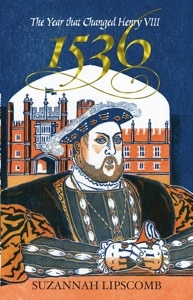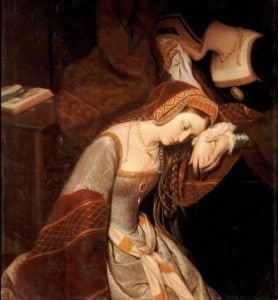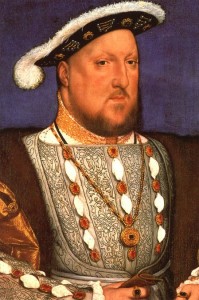 Today, we have a guest post from author and historian, Dr Suzannah Lipscomb, whose book “1536: The Year that Changed Henry VIII” I’ve just reviewed over at our Tudor Book review site. It is a book that really helped me understand what made Henry tick and why he turned into a monster, and which was incredibly useful for the series I wrote on Henry VIII back in June. Thanks go to Suzannah for the following excellent article.
Today, we have a guest post from author and historian, Dr Suzannah Lipscomb, whose book “1536: The Year that Changed Henry VIII” I’ve just reviewed over at our Tudor Book review site. It is a book that really helped me understand what made Henry tick and why he turned into a monster, and which was incredibly useful for the series I wrote on Henry VIII back in June. Thanks go to Suzannah for the following excellent article.
Henry VIII and the Fall of Anne Boleyn
by Dr Suzannah Lipscomb
Over the last couple of weeks, I’ve been thoughtfully reading G.W. Bernard’s new book, Anne Boleyn: Fatal Attractions. Bernard, as I’m sure many of you know, sets out to challenges the prevailing assumptions about Anne – that she resisted Henry’s advances, that she was a Protestant, and that she was innocent of the charges levelled against her in May 1536. He does so on the basis of meticulous research and careful re-readings of the key sources.
It was an interesting read, not least because in several places, I have shared Bernard’s ideas about the importance of certain sources and the interpretation of certain events – and yet, I came to entirely different conclusions, especially when it came to the old chestnut of Anne Boleyn’s fall.
Like Bernard, I’ve been unconvinced about the conspiracy theory version of Anne’s death. It seems to me to rely both on very slender evidence, which is often misused, and emotionally unintelligent readings of the alliances and relationships at the Tudor court. Just to touch the surface of this, I’d suggest that the reasons Thomas Cromwell is supposed to have sided with Anne’s enemies – over issues of foreign policy and what to do with the money from the dissolution of the monasteries – are very weak and unconvincing grounds for destroying an old friend and ally, who happened to be queen of England. Meanwhile, a – probably the – key piece of evidence used to suggest a conspiracy is Eustace Chapuys’s letter after the event, in which he recounted that Cromwell had told him that he had ‘set himself to devise (or to plan) and conspire (or to bring about) the said affair’ (the letter is in French; the original reads, ‘il se mist a fantasier et conspirer le dict affair’). This is the one clear reference to ‘conspiracy’. But, in fact, this comes in the context of Cromwell telling Chapuys that he ‘had been authorised and commissioned by the King to prosecute and bring to an end the mistress’s trial, to do which he had taken considerable trouble. It was he who… had planned and brought about the whole affair’. So it has always seemed to me that the one crucial piece of evidence used to suggest that Cromwell had come up with the whole idea himself actually, in truth, indicts Henry. In this reading, the affair that Cromwell plans and brings about is the matter of investigation, trial, and finally, execution.
 This naturally leads one to think of the version beloved by Hollywood – that Henry had just got tired of Anne, wanted rid of her, and was trumping up these charges. To be honest, I don’t think anything disproves this entirely – except (again, I’m with Bernard here) that Henry and Anne’s marriage doesn’t seem to have been on the rocks, a crucial point on which this argument rests. In the autumn and winter of 1535, they were constantly described as being ‘merry together’, which is probably why Anne conceived, which in turn added to their happiness. But even after Anne’s miscarriage in January 1536, Henry seems to have staged an event in April in which Chapuys, the Imperial ambassador and representative of Charles V in England, bowed to Anne – essentially formally recognising her as Henry’s wife for the first time. I’m with Bernard that this was an unnecessary thing to do if Henry were planning to dispose of his wife shortly thereafter. In April, it looks like he was still on board with their marriage.
This naturally leads one to think of the version beloved by Hollywood – that Henry had just got tired of Anne, wanted rid of her, and was trumping up these charges. To be honest, I don’t think anything disproves this entirely – except (again, I’m with Bernard here) that Henry and Anne’s marriage doesn’t seem to have been on the rocks, a crucial point on which this argument rests. In the autumn and winter of 1535, they were constantly described as being ‘merry together’, which is probably why Anne conceived, which in turn added to their happiness. But even after Anne’s miscarriage in January 1536, Henry seems to have staged an event in April in which Chapuys, the Imperial ambassador and representative of Charles V in England, bowed to Anne – essentially formally recognising her as Henry’s wife for the first time. I’m with Bernard that this was an unnecessary thing to do if Henry were planning to dispose of his wife shortly thereafter. In April, it looks like he was still on board with their marriage.
But chiefly, the reason I don’t believe the Hollywood version is because I don’t think it fits with Henry’s character. Now, I know you’ll be incredulous at this point, but bear with me: the Henry we think of – ruthless, tyrannical, capricious, irritable – is accurate for Henry in the last decade of his life. After 1536, we see all manner of political executions, and whilst some are arguably a response to increased threats against the kingdom, many are driven purely by Henry’s desire for vengeance and out of sheer paranoid cruelty. But before 1536, Thomas More and John Fisher are among the very, very few people Henry sent to their deaths, and all those who were executed for treason had jolly good reasons to face the axe, unlike in Henry’s later life. Even More and Fisher’s deaths were long pondered by Henry, and not an act of rapid extermination as we see in the case of Anne Boleyn. What is more, before the mid-1530s, descriptions of Henry’s character are consistently positive. He’s described by Sebastian Giustinian in 1517, after four years at the English court, as ‘affable and gracious’, a man who ‘harmed no-one’. In 1529, Erasmus said that Henry was ‘a man of gentle friendliness, and gentle in debate; he acts more like a companion than a king’. In his early years, Henry appears to have been friendly, warm, and very generous in both his gifts and his affection. In other words, if we don’t assume that Henry was already a tyrant, then his actions against Anne Boleyn seem to require much more explanation.
The explanation that I would offer is that Henry believed that Anne was guilty of adultery. This revelation came amidst a succession of other shattering events in the year 1536, and was absolutely devastating for the king. He felt he had been terribly betrayed. Henry’s response to Anne came from great depths of grief, pain, anger, and loss. He was never the same again.
Let me get back to where I agree with Bernard. I agree that the poetic account in French by Lancelot de Carles is a very important and somewhat overlooked source. De Carles was secretary to the French ambassador, the Bishop de Tarbes, and close to the court in May 1536. His account was probably written in June 1536, though it was published a lot later.
What I don’t think it does, as Bernard implies, is prove that Anne was guilty. What I do think it does, is explain why she was thought to be guilty. And here, I stand in debt to Greg Walker, whose 2002 article on Anne Boleyn’s fall seems to me to be the definitive answer.
The French poem by de Carles suggests that rumours about Anne’s behaviour with certain men arose after one of her ladies-in-waiting, Elizabeth Browne, the countess of Worcester, was challenged by her brother over her own indiscretions, and deflected the criticism by accusing Anne of worse behaviour with ‘Marc’ (Smeaton). She then, fatally, added:
‘A point from it all which seems to me the worst
Is that it is her brother that is often with her
In her bed, knowing her carnally…’ (my clumsy translation)
Elizabeth Browne’s brother found himself in a double bind: report these rumours of Anne’s behaviour and perhaps be prosecuted under the 1534 Act of Treasons for speaking against the queen; or conceal them and suffer worst consequences if they came out and it emerged he had stayed silent. The poem suggests that he decided to tell two men close to the king (Bernard suggests, plausibly, that these men were Cromwell and Fitzwilliam), and these two told the king of Anne’s alleged behaviour. And here, I think, we find the key to it all. Henry reacts by being so shocked that he blanched and ‘remained in a doubtful spirit’, but in the end, he instructed Cromwell and Fitzwilliam to investigate the matter, and added this crucial clause:
‘But if it turns out that your report, which I do not want to believe,
Is not truthful,
You will suffer pain of death in their place.’ (my translation)
I don’t know why historians have not made more of this. It fits entirely with the account given by Cromwell to Chapuys, above, and elsewhere by Cromwell to Gardiner and Wallop (the English ambassadors at the French court) that ‘the Queen’s incontinent living was so rank and common that the ladies of her privy chamber could not conceal it. It came to the ears of some of the Council, who told his Majesty, although with great fear’. Above all, it explains why Cromwell had to find sufficient proof of Anne’s guilt: if he did not, he himself would die.
 This version – of Henry as surprised and aghast at the idea of his long-desired wife committing adultery – also makes sense of Henry’s actions after this revelation.
This version – of Henry as surprised and aghast at the idea of his long-desired wife committing adultery – also makes sense of Henry’s actions after this revelation.
He left the May Day jousts to question personally his dear friend, Henry Norris, who was among the accused. One account suggests that Norris confessed and then later retracted; either way, Henry was not assured of his innocence. Convinced by this and Mark Smeaton’s confession that same day, Henry in disgust poured all his energies into plans for dispatching Anne. Eric Ives says that Henry was ‘morbidly concerned’ with the execution plans, including the building of the scaffolds and ordering that expensive French executioner from Calais (his price of £23 6s 8d should be compared with Holbein’s salary as court painter of £30 a year).
Henry also demonstrated enormous hyperbolic self-pity. The evening of the day that Anne was taken to the Tower, he wept over his daughter, Mary, and his illegitimate son, Henry Fitzroy (who would die just two months later), saying that they ‘were greatly bound to God for having escaped the hands of that accursed wh*re, who had determined to poison them’. He told people that Anne had slept with ‘upwards of 100 gentlemen’, and composed a tragedy about his life that he offered people to read.
Above all, of course, he went out ‘banqueting with ladies, sometimes remaining after midnight and returning by river’. His flirtation with Jane Seymour became serious. He lodged her within a mile of his palace, and provided officers from the royal household to serve her. After Anne’s death, the couple were betrothed the next day, and married within 10 days.
What was going on here? Well, the depths of Henry’s humiliation at Anne’s apparent betrayal can only be understood if we know that in the sixteenth century, a wife’s adultery suggested her husband’s lack of sexual dominance. A man would, it was thought, only be cuckolded if he were unable to satisfy his wife. Furthermore, Anne had said as much. In her trial with her brother, George Boleyn, Lord Rochford, on 15 May, Rochford was given a piece of paper with an accusation written on it, and told not to read it aloud. He flagrantly disobeyed, and voiced before the gathered crowd of 2,000 the charge that he and Anne had laughed together and ridiculed the king for his dress, his poetry, and above all, because he ‘was not skilful in copulating with a woman and had neither vigour nor potency’. Rochford did not deny it. Henry’s unseemly haste in re-marrying was a way of demonstrating to all those people who mattered that, in fact, he did still have what it took to be a man.
There is, of course, much more to this story. Why did Smeaton confess? What proves Anne was innocent? What evidence suggested she was guilty? And what else does this tell us about Henry VIII and his court? I believe that this event, among the other tragedies and blows of this fateful annus horribilis of 1536, changed Henry entirely. But that’s another story.
Suzannah’s Book
Click here to read my review of “1536: The Year that Changed Henry VIII” which David Starkey described as “a bold and original attempt to unravel one of the greatest mysteries of English history: how, when and why Henry VIII changes from a handsome Prince Charming into a fat and loathsome Bluebeard.”